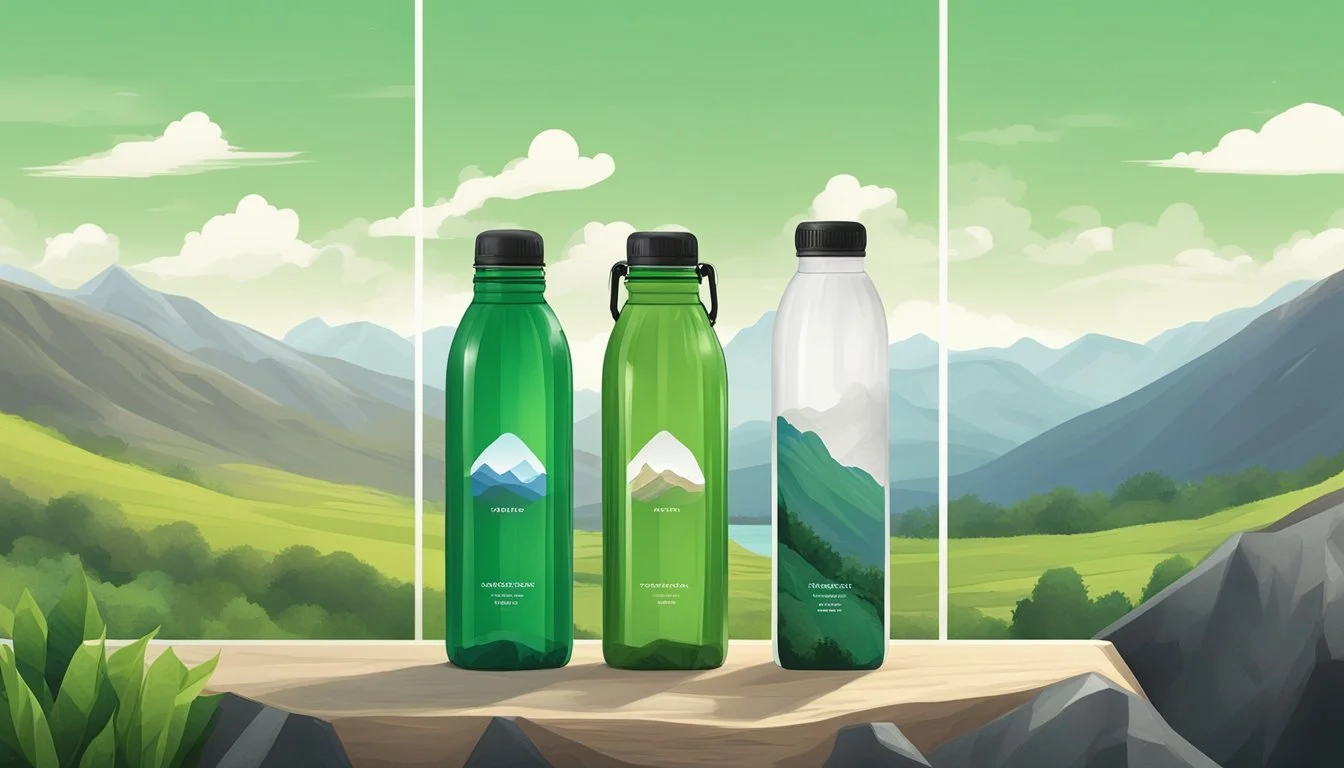Mountain Valley Spring Water vs. Kroger
Comparing Quality and Value
Comparing two popular bottled water brands, Mountain Valley Spring Water and Kroger, provides a clear insight into which one stands out in terms of quality and taste. Mountain Valley, sourced from Arkansas springs, is celebrated for its light, clean, and slightly sweet flavor, complemented by a smooth, velvety texture.
On the other hand, Kroger's bottled water, while affordable and widely accessible, often lacks the distinctive taste and mineral balance found in premium brands. For those prioritizing taste and purity, Mountain Valley Spring Water is the superior choice.
Examining these differences helps consumers make an informed decision, ensuring they select the bottle that best meets their needs and preferences. Whether it's the subtle sweetness of Mountain Valley or the practicality of Kroger, understanding these facets can enhance any hydrating experience.
Comparing Brands
Understanding the differences between Mountain Valley Spring Water and Kroger bottled water involves examining their company profiles, histories, and types of water offered.
Company Profiles
Mountain Valley is a well-established brand known for its spring water sourced from the Ouachita Mountains in Arkansas. Founded in 1871, the company has built a reputation for providing high-quality, mineral-rich water in environmentally conscious glass bottles. Their focus is on premium products with a commitment to sustainability.
Kroger is a retail giant that offers a wide range of products, including bottled water. Their water products comply with FDA regulations, ensuring safety and quality. While Kroger is not primarily a bottled water company, it provides accessible and affordable water options for consumers, often utilizing purified municipal sources.
History and Origin of Sources
Mountain Valley water originates from a protected aquifer in the Ouachita Mountains. This source is known for delivering naturally mineral-rich water. The company prides itself on the historical purity and natural filtration process that enhances the taste and health benefits of its water.
Kroger bottled water typically comes from municipal sources, and it undergoes a purification process to meet safety standards. Some bottles are labeled as spring water, sourced from various locations, but most of their bottled water is purified or distilled. The origin of Kroger’s water can vary, depending on the product line.
Types of Bottled Water Offered
Mountain Valley offers several types of bottled water, including spring water, sparkling water, and flavored versions. All their products contain naturally occurring minerals, contributing to a unique taste profile. The use of BPA-free glass bottles is a key aspect of their packaging, catering to environmentally-conscious consumers.
Kroger’s bottled water lineup includes purified water, spring water, and distilled water. They also provide flavored and sparkling options under different brand names. While their products ensure basic hydration and safety, they do not emphasize mineral content or premium features. Many of Kroger's bottles are now BPA-free, reflecting a shift towards safer packaging materials.
Water Source and Quality
Mountain Valley Spring Water and Kroger bottled water differ significantly in terms of their source and quality. This section will dive into these differences, exploring their origin, mineral content, and safety measures.
Understanding the Sources
Mountain Valley Spring Water is sourced from a natural spring in Arkansas. This spring water is celebrated for its pristine origin and the minimal processing it undergoes before bottling. The water comes from a protected area which ensures a higher level of purity and natural minerals.
Kroger Bottled Water, on the other hand, is typically sourced from municipal supplies. This means it may originate from local water systems which are then treated and purified. Unlike Mountain Valley, Kroger's sources can vary widely depending on the location where the water is bottled.
Quality Assessment
In terms of quality, Mountain Valley Spring Water maintains high standards due to its natural filtration through geological layers, which enriches it with minerals like calcium and magnesium. This water has a distinct taste that many find appealing due to its natural mineral content.
Kroger Bottled Water adheres to FDA regulations, ensuring it meets safety and quality standards. The water is usually subjected to processes such as reverse osmosis and microfiltration to remove contaminants. Despite these purification steps, it might lack the rich mineral profile found in natural spring water, offering a more neutral taste.
Contaminants and Filtration
Mountain Valley benefits from natural filtration processes, reducing the presence of contaminants like lead and arsenic. Regular testing ensures that the water complies with EPA standards, making it a reliable option for consumers concerned about water safety.
Kroger Bottled Water goes through intense filtration methods such as reverse osmosis to eliminate contaminants. Microplastics and BPA have raised concerns, but many bottles are now BPA-free. Besides, Kroger’s water may still contain trace amounts of heavy metals and other contaminants, despite filtration efforts.
Safety measures and quality reports are crucial for both brands. While Mountain Valley boasts a robust natural purification process, Kroger depends on advanced technological methods to ensure water safety. Each brand's approach reflects their different sources and the distinct quality control challenges they face.
Health and Hydration Benefits
Mountain Valley Spring Water and Kroger Bottled Water differ significantly in terms of their nutritional content and potential health impacts. Here, we focus on their mineral composition and how they contribute to overall hydration and well-being.
Nutritional Content Comparison
Mountain Valley Spring Water is praised for its balanced mineral composition. This spring water contains naturally occurring calcium, magnesium, and potassium, which are essential for various bodily functions. The minerals not only enhance the taste but also contribute to electrolyte balance, supporting muscle function and nerve signaling.
Mineral Mountain Valley (mg/L) Kroger (mg/L) Calcium 7.3 4.2 Magnesium 3.2 1.0 Potassium 1.0 0.5
Kroger Bottled Water, typically purified water, often lacks these minerals due to the purification process. While it meets safe drinking standards, the lower mineral content may limit its health benefits compared to spring water. Some purified options may have minerals added back, but this can vary widely between products.
Hydration and Health Implications
Drinking water with a good mineral profile adds more than just hydration; it supports various health aspects. Alkaline water like Mountain Valley's may help neutralize stomach acid and improve hydration efficiency. The presence of electrolytes in Mountain Valley Spring Water can aid in rapid rehydration, especially after physical activity.
Kroger Bottled Water, being purified, serves as safe drinking water with fewer potential contaminants. However, the lack of naturally occurring electrolytes might make it less effective for rehydration in certain situations, such as during intense exercise or in cases of diabetes where electrolyte balance is crucial.
Individuals focusing on hydration and health might prefer water with a balanced mineral content. This choice can impact daily hydration needs, muscle function, and even metabolic processes, offering noticeable benefits in overall well-being.
Packaging and Environmental Impact
When comparing Mountain Valley Spring Water and Kroger bottled water, it's crucial to consider the materials used in their bottles and their respective impacts on the environment.
Bottle Materials and Sustainability
Mountain Valley Spring Water primarily uses glass bottles and 100% recyclable aluminum bottles. Glass bottles are sustainable as they can be recycled indefinitely without losing quality. Aluminum, while also recyclable, adds the benefit of being lighter than glass, reducing transportation emissions.
Kroger bottled water is typically packaged in plastic water bottles. These bottles adhere to FDA regulations and many are now BPA-free, reducing concerns over BPA contamination. However, plastic bottles are a significant source of microplastics, with particles often ending up in oceans and affecting marine life.
Material Mountain Valley Kroger Glass Yes No Aluminum Yes (100% recyclable) No Plastic No Yes (BPA-free)
Environmental Considerations
The environmental impact of bottled water largely stems from their production and disposal. Mountain Valley's use of glass and aluminum supports better sustainability practices. Glass production, though energy-intensive, results in minimal waste if recycled properly. Aluminum production has a smaller carbon footprint over time due to its light weight and recyclability.
Kroger's reliance on plastic water bottles involves greater environmental drawbacks. These include pollution, waste, and contributions to microplastics in the ecosystem. While adhering to good manufacturing practices helps, the ecological footprint is notable. The Environmental Protection Agency highlights the importance of reducing plastic waste to mitigate broader environmental impacts.
By choosing materials responsibly, companies can reduce their negative environmental impact and contribute to better sustainability, aligning with growing environmental protection standards.
Consumer Experience
Mountain Valley Spring Water and Kroger bottled water each provide unique experiences that cater to different consumer preferences. They differ notably in taste profile and the ease with which they can be found in stores.
Taste Profile
Mountain Valley Spring Water is often praised for its light and clean taste. The water has a subtle sweetness and a velvety texture that appeals to many connoisseurs. Ranked highly in bottled water power rankings, it offers a refreshing experience that suggests a hint of mineral presence, which is a marker of its natural spring water origin.
Kroger bottled water, adhering to FDA regulations, ensures safety and quality. However, consumers sometimes note a less distinctive taste, potentially due to its filtered water source. While many Kroger bottles are now BPA-free, there are still mild concerns about potential microplastics. Despite these factors, some consumers find it a reliable and neutral option for daily hydration.
Product Availability and Accessibility
Mountain Valley Spring Water is available in select locations, typically in higher-end grocery stores and specialty shops. This premium brand can occasionally be harder to find, making it less accessible for some consumers.
Kroger bottled water, conversely, enjoys widespread availability. Found in Kroger grocery stores and affiliated chains, it ensures more consistent access for consumers. This broad distribution makes it a more convenient choice for those looking for an everyday water option. Additionally, its competitive pricing appeals to a broader audience.
Regulatory Compliance and Industry Standards
Mountain Valley Spring Water and Kroger bottled water adhere to stringent safety and quality regulations set by federal agencies and industry organizations to ensure consumer safety and product reliability.
FDA and EPA Standards
Both Mountain Valley Spring Water and Kroger bottled water must comply with regulations from the Food and Drug Administration (FDA) and the Environmental Protection Agency (EPA). The FDA oversees bottled water, ensuring it meets specific safety standards.
This includes limits on contaminants and specific identity standards for different types of water, such as spring or purified. The EPA, on the other hand, sets standards for tap water, which sometimes serves as a comparative baseline for bottled water quality.
Mountain Valley Spring Water is sourced from natural springs and undergoes rigorous testing to meet these standards. Kroger water, typically purified and bottled, also adheres to FDA guidelines, which require regular testing for contaminants such as microplastics and BPA.
Certification and Memberships
Both brands are often tested and certified by independent organizations to validate their claims. For instance, Mountain Valley Spring Water holds certifications from associations like the International Bottled Water Association (IBWA). This certification indicates adherence to additional quality benchmarks beyond those required by federal regulations.
Kroger follows similar paths by complying with recognized certifications that ensure the water's safety and quality. Membership in the IBWA also often involves adherence to supplementary industry-specific guidelines, ensuring that both brands not only meet but often exceed basic compliance requirements.
The rigorous standards set by both the FDA and EPA and affiliations with reputable industry organizations underscore the commitment to ensuring consumer safety and maintaining high-quality standards.
The Bottom Line
When choosing between Mountain Valley Spring Water and Kroger bottled water, consumers must consider quality, health aspects, and the source of the water.
Summary of Key Comparisons
Mountain Valley Spring Water emerges as the top contender in terms of quality. It is sourced from Arkansas springs, known for its light and clean taste with a subtle mineral presence. Many consumers appreciate its velvety texture and barely sweet finish.
Kroger bottled water, on the other hand, meets FDA regulations for safety and quality. However, concerns about contaminants like microplastics and the environmental impact of plastic usage have been raised. It's worth noting that many Kroger bottles are now BPA-free, somewhat mitigating health concerns.
Final Recommendations
For those prioritizing taste and quality, Mountain Valley Spring Water is the recommended choice. Its reputable source and consistent high marks in taste tests make it a favorite.
However, for consumers focusing on cost-effectiveness and convenience, Kroger offers a viable alternative. While it may not match Mountain Valley in quality, it does adhere to safety standards and is readily available.
Sustainability concerns may tip the scale towards Mountain Valley for environmentally-conscious buyers, due to the debated impact of plastic use in bottling Kroger water. Overall, the choice hinges on individual priorities regarding taste, source, and environmental impact.
More About Mountain Valley Spring Water
Acqua Panna vs Mountain Valley Spring Water: Which Bottled Water is Better?
Aquafina vs Mountain Valley Spring Water: Which Bottled Water is Better?
Arrowhead vs Mountain Valley Spring Water: Which Bottled Water is Better?
Bai vs Mountain Valley Spring Water: Which Bottled Water is Better?
Boxed Water vs Mountain Valley Spring Water: Which Bottled Water is Better?
Core Hydration vs Mountain Valley Spring Water: Which Bottled Water is Better?
Dasani vs Mountain Valley Spring Water: Which Bottled Water is Better?
Deer Park vs Mountain Valley Spring Water: Which Bottled Water is Better?
Essentia vs Mountain Valley Spring Water: Which Bottled Water is Better?
Eternal vs Mountain Valley Spring Water: Which Bottled Water is Better?
Ethos vs Mountain Valley Spring Water: Which Bottled Water is Better?
Evian vs Mountain Valley Spring Water: Which Bottled Water is Better?
Fiji vs Mountain Valley Spring Water: Which Bottled Water is Better?
Mountain Valley Spring Water vs HFactor: Which Bottled Water is Better?
Ice Mountain vs Mountain Valley Spring Water: Which Bottled Water is Better?
Icelandic Glacial vs Mountain Valley Spring Water: Which Bottled Water is Better?
Just Water vs Mountain Valley Spring Water: Which Bottled Water is Better?
LIFEWTR vs Mountain Valley Spring Water: Which Bottled Water is Better?
Mountain Valley Spring Water vs 1907water: Which Bottled Water is Better?
Mountain Valley Spring Water vs 7-Select: Which Bottled Water is Better?
Mountain Valley Spring Water vs Action: Which Bottled Water is Better?
Mountain Valley Spring Water vs Alkaline88: Which Bottled Water is Better?
Mountain Valley Spring Water vs Antipodes: Which Bottled Water is Better?
Mountain Valley Spring Water vs Aqua Carpatica: Which Bottled Water is Better?
Mountain Valley Spring Water vs Augi: Which Bottled Water is Better?
Mountain Valley Spring Water vs Big Chill: Which Bottled Water is Better?
Mountain Valley Spring Water vs Big Win: Which Bottled Water is Better?
Mountain Valley Spring Water vs Blk: Which Bottled Water is Better?
Mountain Valley Spring Water vs BodyArmor: Which Bottled Water is Better?
Mountain Valley Spring Water vs Cascade Mountain: Which Bottled Water is Better?
Mountain Valley Spring Water vs Castle Rock: Which Bottled Water is Better?
Mountain Valley Spring Water vs CBD Living: Which Bottled Water is Better?
Mountain Valley Spring Water vs Cirro: Which Bottled Water is Better?
Mountain Valley Spring Water vs Crystal Geyser: Which Bottled Water is Better?
Mountain Valley Spring Water vs Crystal Lake: Which Bottled Water is Better?
Mountain Valley Spring Water vs Defy: Which Bottled Water is Better?
Mountain Valley Spring Water vs Erewhon: Which Bottled Water is Better?
Mountain Valley Spring Water vs Essence pH10: Which Bottled Water is Better?
Mountain Valley Spring Water vs Flow: Which Bottled Water is Better?
Mountain Valley Spring Water vs Hawaii Volcanic: Which Bottled Water is Better?
Mountain Valley Spring Water vs Hawaiian Springs: Which Bottled Water is Better?
Mountain Valley Spring Water vs Kirkland Signature: Which Bottled Water is Better?
Mountain Valley Spring Water vs Liquid Death: Which Bottled Water is Better?
Mountain Valley Spring Water vs Mananalu: Which Bottled Water is Better?
Mountain Valley Spring Water vs Nestle Pure Life: Which Bottled Water is Better?
Mountain Valley Spring Water vs Open Water: Which Bottled Water is Better?
Mountain Valley Spring Water vs Ophora: Which Bottled Water is Better?
Mountain Valley Spring Water vs Origin: Which Bottled Water is Better?
Mountain Valley Spring Water vs Ozarka: Which Bottled Water is Better?
Mountain Valley Spring Water vs Path: Which Bottled Water is Better?
Mountain Valley Spring Water vs Penta: Which Bottled Water is Better?
Mountain Valley Spring Water vs Perrier: Which Bottled Water is Better?
Mountain Valley Spring Water vs Poland Spring: Which Bottled Water is Better?
Mountain Valley Spring Water vs Proud Source: Which Bottled Water is Better?
Mountain Valley Spring Water vs Purely Sedona: Which Bottled Water is Better?
Mountain Valley Spring Water vs Ramona: Which Bottled Water is Better?
Mountain Valley Spring Water vs Refreshe: Which Bottled Water is Better?
Mountain Valley Spring Water vs Richard's Rainwater: Which Bottled Water is Better?
Mountain Valley Spring Water vs San Pellegrino: Which Bottled Water is Better?
Mountain Valley Spring Water vs Simple Truth: Which Bottled Water is Better?
Mountain Valley Spring Water vs Skyra: Which Bottled Water is Better?
Mountain Valley Spring Water vs Smartwater: Which Bottled Water is Better?
Mountain Valley Spring Water vs Solan de Cabras: Which Bottled Water is Better?
Mountain Valley Spring Water vs Starkey: Which Bottled Water is Better?
Mountain Valley Spring Water vs Tahoe: Which Bottled Water is Better?
Mountain Valley Spring Water vs Talking Rain AQA: Which Bottled Water is Better?
Mountain Valley Spring Water vs The Well: Which Bottled Water is Better?
Mountain Valley Spring Water vs Topo Chico: Which Bottled Water is Better?
Mountain Valley Spring Water vs Tru Alka: Which Bottled Water is Better?
Mountain Valley Spring Water vs Volvic: Which Bottled Water is Better?
Mountain Valley Spring Water vs Voss: Which Bottled Water is Better?
Mountain Valley Spring Water vs Waiakea: Which Bottled Water is Better?
Mountain Valley Spring Water vs Weird Water: Which Bottled Water is Better?
Mountain Valley Spring Water vs Whole Foods 365: Which Bottled Water is Better?
Mountain Valley Spring Water vs Zenwtr: Which Bottled Water is Better?
Mountain Valley Spring Water vs Zephyrhills: Which Bottled Water is Better?







